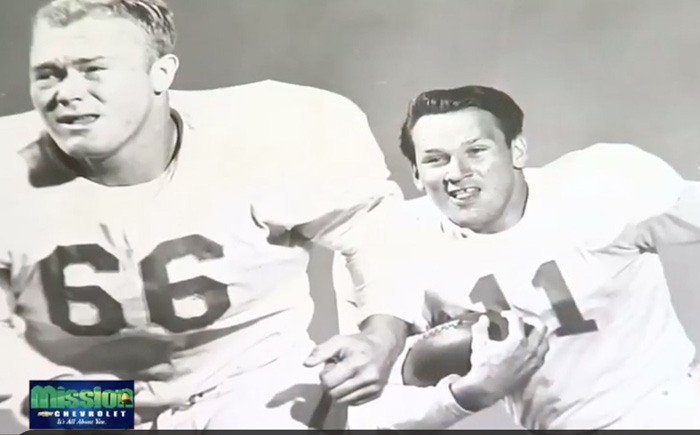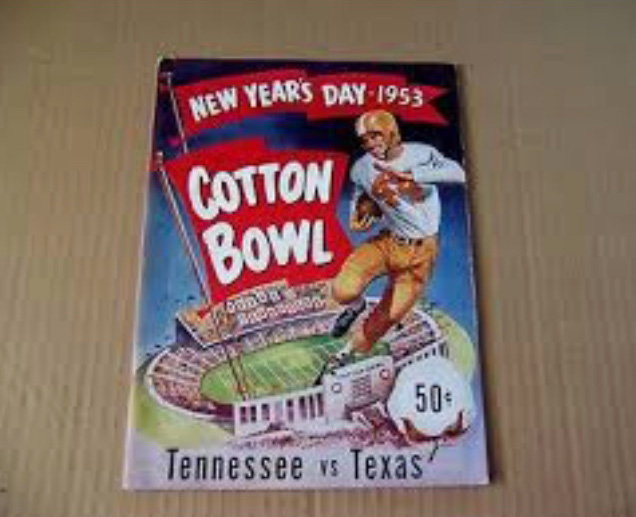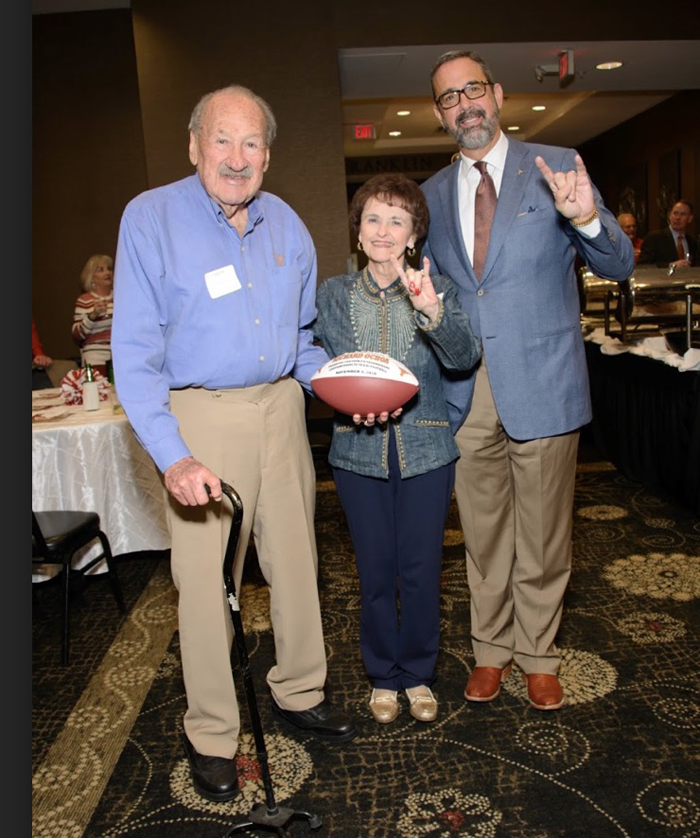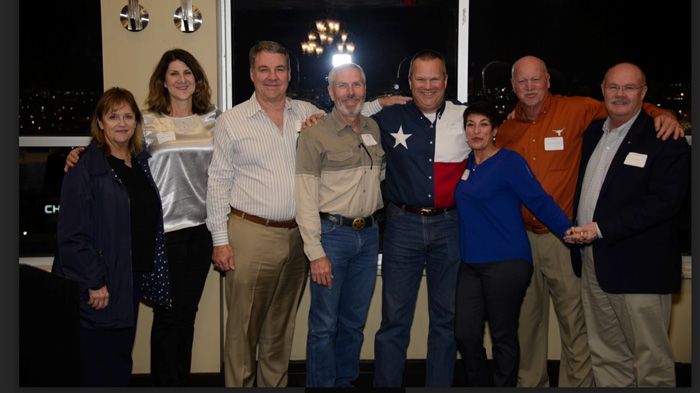“Walk in the back, Mex!”
Such a slur is an offensive slur by any standard today. We tend to forget the sacrifices and discrimination our parents and relatives may have endured outside of Laredo as our nation struggled with the meaning of “American” in changing times.
Such was the case for Laredo native Richard Ochoa. Born on May 10, 1931, he was the youngest of the sons of Luis and Rafaela Ochoa.
The contributions Richard and his brothers made to our country and the world from the then-obscure bordertown of Laredo were and are immense. That didn’t, however, make them immune to discrimination.
Imagine being the youngest sibling in your family and watching six of your older brothers go off to war. It must have been hard to fathom, and even harder for our grandmother who had already lost her husband and prayed the Rosary diligently to secure protection for her sons in World War II.
Through it all, the message of service, pride, and doing what’s right was ingrained in all of the Ochoa siblings. Making a difference in an ever-changing world was paramount in their upbringing and powered by their pride in and loyalty to family and country.
Richard was a groundbreaking young Hispanic, only the second Mexican-American to play Division I football for the flagship University of Texas at Austin. After his older brother Edward, a Marine aviator, got Richard a football scholarship to Centenary College in Shreveport, Louisiana, he followed it up by securing Richard a scholarship to play football for the University of Texas at Austin. Thus began the life-changing journey of this young Laredoan in the predominantly Anglo world of 1950-era college athletics.
Richard entered UT and played fullback, often doing the grunt work of more difficult tasks as backup to an outstanding running back from Odessa, Brian Townsend, a Texas All-State high school football player. During a pivotal game against number one ranked SMU, Brian was injured in a kickoff return and was carried off the field on a stretcher.
UT coach Ed Price turned to his bench and running back coach Eck Curtiss and asked, “Who do I have in backup?”
“Ochoa, sir,” came the response.
“Ochoa? Who the hell is that?”
Coach Curtiss assured Price that Richard was ready and capable.
Coach Price summoned Richard, asking, “Are you ready, son? Do you know the plays?”
The young Laredoan replied in the affirmative.
“Well, get in there,” Coach Price said excitedly as he slapped Richard on the back so hard that it made him stumble and fall – an inauspicious start that would soon be lost and forgotten to Ochoa’s bullish running style and his outstanding performance as UT upset SMU.
As related to us by our fathers and uncles, Coach Price sought out Richard and told him, “Son, from now on you’re gonna’ be my regular fullback.”
This was humbly acknowledged by Richard, who went on to be a Tri- Captain of the football team and an All Southwest Conference Fullback, this in the racially charged “good ole boy” era.
Richard took the racially insensitive comments and treatment from his teammates in stride, never letting it get to him. After all, he had been raised by his family to be proud and always confident.
Richard was named the Most Valuable Player of the 1953 Cotton Bowl as the Texas Longhorns upset top-ranked Tennessee 16-0. Notably, he ran 108 yards on 26 carries. He was presented the game ball signed by all his teammates for his outstanding efforts.
Despite all he had overcome, however, the stigma of discrimination remained. Upon the team’s triumphant return to Austin, a local judge threw a party on the lake honoring the team.
When Richard showed up with his teammates, he was greeted by a gatekeeper who asked, “Name, please?”
“Ochoa?” The gatekeeper scanned his list of approved attendees, eventually replying, “I’m sorry sir, you’re not on the list…you can’t
come in.”
His teammates protested and insisted he be allowed in, but Richard told them to have a good time and walked back to the dorm.
My family and I heard this story for many years in obvious outrage. How could this be?
Despite having every reason to be bitter and upset with the University of Texas, Richard, true to his upbringing, never had a disparaging word to say about his college experience. On the contrary, he and his beloved wife of 65 years, Marilyn, also a UT graduate, are the most dedicated UT fans you’d ever meet.
I did not feel so forgiving, and one day, in light of the changing administration in UT athletics, I finally set procrastination aside and wrote to the new athletic director, Chris Del Conte, asking him to try to make amends to my Uncle Richard for the horrendous slight thrust upon him in the 1950s.
Coach Del Conte seemed like a fair and just man and was actively changing the culture and attitude of UT athletics. Still, given the enormity of the University of Texas, I thought I would never hear back. I continued to email him, even sending a TV interview with Richard aired by his now-hometown news station KVIA in El Paso. The story highlighted his Cotton Bowl MVP award and the discrimination that followed during the team celebration in Austin.
Early one morning my phone rang. It was UT women’s athletic director Christine Plonsky, a living legend in UT athletics.
“Albert, it’s a small world…my father knows your Uncle Richard and says he was one of the nicest people he ever met.” Thus began our family’s path to make right the unfair treatment our beloved uncle had experienced 64 years earlier.
Christine had been handed the letter and the task of making amends, which she personally oversaw. She appointed her staff, headed by Darlene Camacho, now an adopted Ochoa family member, to coordinate the overdue recognition and acknowledgement of Richard’s service. For the event, they selected a UT-Exes dinner scheduled for November 8, 2018 in El Paso. It prompted a huge family response from the Ochoa clan to attend and bear witness in support of their beloved uncle. Ochoas came from Louisiana, Virginia, Connecticut and California, as well as from Austin and Laredo.
UT’s new Athletic Director, Chris Del Conte, spoke to the crowd, eventually acknowledging the discriminatory acts Richard had been subjected to, but also thanking him for his service to the University of Texas Athletics program.
Thanks to the outstanding efforts of Chris Plonsky, our family is at peace knowing that our beloved Uncle Richard, now 87, was witness and part of an event of amends and reconciliation. We are all forever in Plonsky’s debt for making this happen, and grateful, too, to Darlene Camacho who did such a fine job to coordinate it.








Thanks for this story. I remember my Dad talking about Richard at UT and of course his brothers were all athletes also in addtion to serving in WWII. Albert Ochoa taught and coached for many years at LISD, Martin & then Nixon. Just an e xemplary family all the way around .
I’m so glad that the University did the right thing here. I’m so sorry that anyone ever has to feel slighted like this. Too bad the offending judge never made amends…
How do you know that?
Richard would’ve said something to that effect.
Such a great story and can’t imagine how difficult it must have been for him in those days. This has the makings of a movie.
Such a great story and can’t imagine how difficult it must have been for him in those days. This has the makings of a movie.
My partner , Larry Fallek, had a cousin from Harlingen was Richard’s roommate at football dorm . Larry saw them both play at UT. Thanks for sharing.
So you didn’t like my remark.